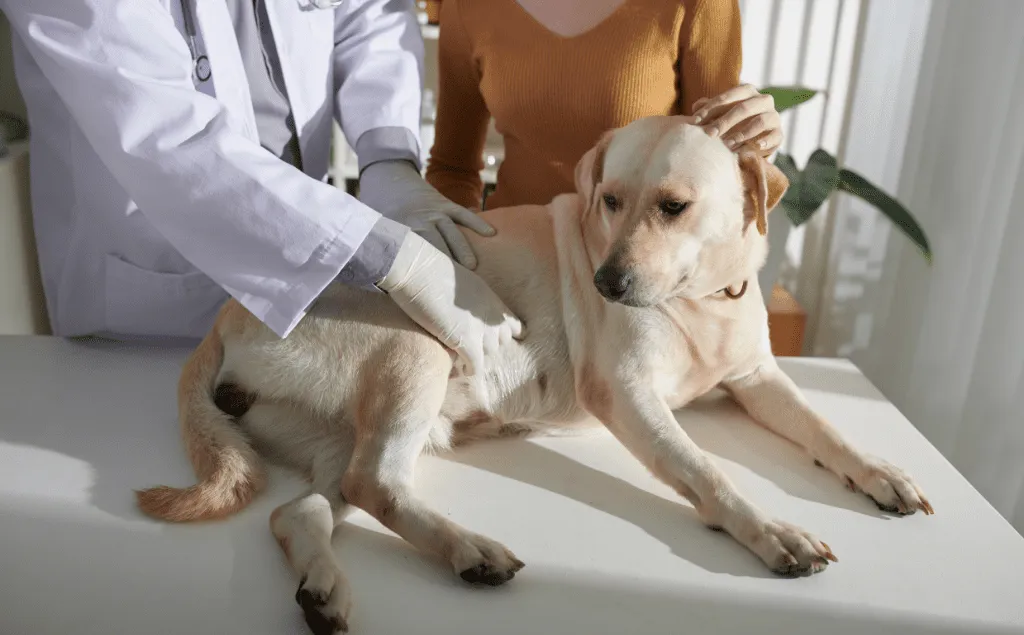A swollen abdomen in dogs is a concerning symptom that often signals a serious underlying health issue. If you’ve noticed your canine companion’s belly appears unusually distended, it’s crucial to seek immediate veterinary attention. Prompt diagnosis and treatment are vital, as many conditions causing abdominal swelling can be life-threatening.
This article will delve into the various causes of a swollen stomach in dogs, highlighting the critical signs to watch for and emphasizing the importance of swift medical intervention. Understanding these symptoms can empower you to act quickly and ensure your dog receives the best possible care.
 A dog with a visibly distended abdomen
A dog with a visibly distended abdomen
Understanding the Signs of a Swollen Abdomen in Dogs
When a dog presents with a swollen stomach, it’s essential to observe for accompanying symptoms. These additional clues can assist veterinarians in pinpointing the exact cause and initiating appropriate treatment. The manifestations can vary significantly depending on the underlying condition.
1. Ascites: Fluid Accumulation in the Abdomen
Ascites refers to the buildup of fluid within the abdominal cavity. This condition is frequently associated with severe internal diseases, including:
- Heart Failure: The heart’s inability to pump blood effectively can lead to fluid backing up into the abdomen.
- Kidney Disease: Compromised kidney function can result in fluid and electrolyte imbalances, contributing to ascites.
- Liver Disease: A diseased liver may struggle to produce essential proteins, affecting fluid regulation and leading to abdominal fluid accumulation.
- Intestinal Issues: Certain gastrointestinal problems can disrupt fluid absorption and transport, causing swelling.
- Late-Stage Heartworm: Advanced heartworm infestation can damage the heart and lungs, leading to ascites as a secondary symptom.
Diagnosing the precise cause of ascites requires a thorough veterinary examination, including blood tests, imaging, and potentially fluid analysis. The treatment approach will be tailored to the specific diagnosed illness.
2. Cushing’s Syndrome: An Overproduction of Cortisol
Cushing’s syndrome, also known as hyperadrenocorticism, occurs when the adrenal glands produce an excess of cortisol, a stress hormone. While not common, it’s more prevalent in older dogs. The excess cortisol can lead to generalized swelling, with the abdomen being a common area for accumulation.
Other hallmarks of Cushing’s syndrome include:
- Increased appetite and excessive weight gain.
- Compulsive water drinking and frequent urination.
- Pacing and anxious behavior.
- Hair loss, particularly on the body.
- Development of large, fatty deposits.
3. Peritonitis: Inflammation of the Abdominal Lining
Peritonitis is a severe inflammation of the peritoneum, the membrane lining the abdominal cavity. It can arise from various causes, including:
- Puncture Wounds: Trauma that penetrates the abdominal wall can introduce bacteria and lead to infection.
- Internal Infections: Infections originating within abdominal organs can spread to the peritoneum.
- Ruptured Organs: A tear in an organ like the stomach or intestines can spill infectious contents into the abdominal cavity.
Peritonitis is a critical medical emergency that often requires immediate surgical intervention. Prompt treatment is crucial, as the condition can deteriorate rapidly, potentially leading to sepsis and organ failure within hours. It can also be indicative of other serious underlying diseases that also require urgent care.
4. Gastric Dilatation-Volvulus (GDV): A Life-Threatening Twist
Gastric Dilatation-Volvulus (GDV), commonly known as bloat, is a potentially fatal condition where the stomach fills with gas and fluid and then twists on itself. This twisting obstructs the passage of food and gas from the stomach and cuts off blood supply to vital organs. GDV can be fatal within hours if not treated immediately.
While the exact cause isn’t always clear, certain factors increase the risk:
- Deep-chested breeds: Dogs with large, narrow chests, such as Great Danes, German Shepherds, and Weimaraners, are more susceptible.
- Eating habits: Gulping food or water rapidly can lead to swallowing excess air.
- Exercise after meals: Strenuous activity shortly after a large meal can contribute to stomach twisting.
Preventative measures include feeding smaller meals multiple times a day, using slow-feeder bowls, and avoiding vigorous exercise after eating, especially for at-risk breeds.
5. Trauma and Injury
Abdominal injuries, even those not directly affecting the belly, can lead to internal swelling. Trauma from:
- Car accidents.
- Falls from significant heights.
- Impacts from heavy objects.
can cause internal bleeding and swelling that may collect in the abdominal area. If you suspect your dog has suffered an injury and notice signs of pain and swelling, a veterinary check-up is essential. Internal bleeding is a serious concern that requires immediate attention.
When to Seek Emergency Veterinary Care
A swollen abdomen in dogs is almost always a reason for concern. It’s imperative to contact your veterinarian or an emergency veterinary clinic immediately if you observe this symptom, especially if accompanied by any of the signs mentioned above. Delaying treatment can significantly impact your dog’s prognosis, as many of these conditions require urgent medical or surgical intervention.
Remember, it’s always better to err on the side of caution when your dog’s health is at stake. Swift action can be the difference between a full recovery and a tragic outcome.
For immediate assistance or to schedule an appointment, please contact EVCC. We offer exceptional emergency care for pets and are available 24/7 to support you and your dog through critical health situations.
References
- Ascites in Dogs
- GDV (Bloat) in Dogs: A Timeline
- Human Foods Dogs Can Eat
- Signs of a Dog in Pain
- Dog Surgery
- Blood in Dog Urine
- EVCC Locations
